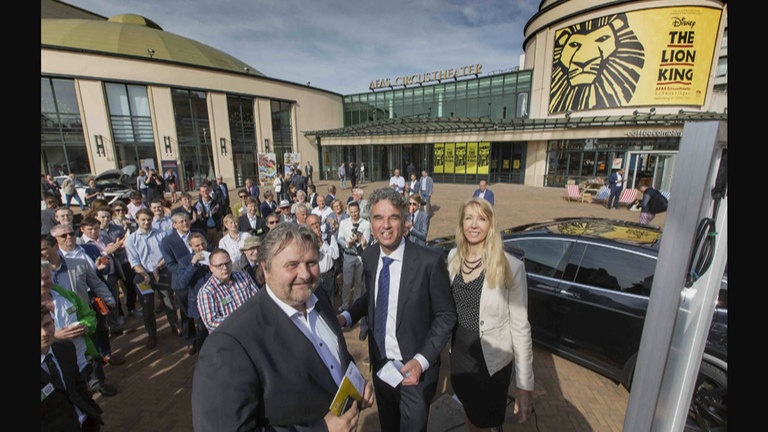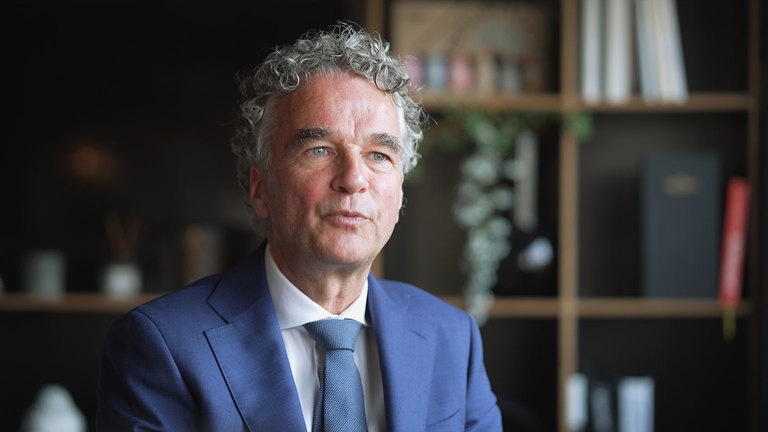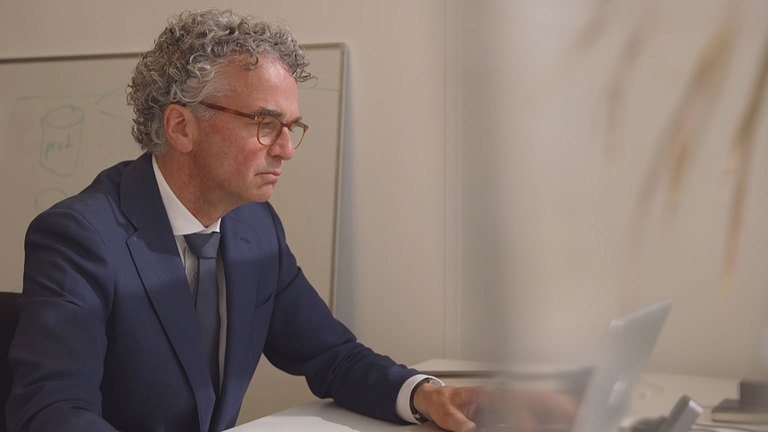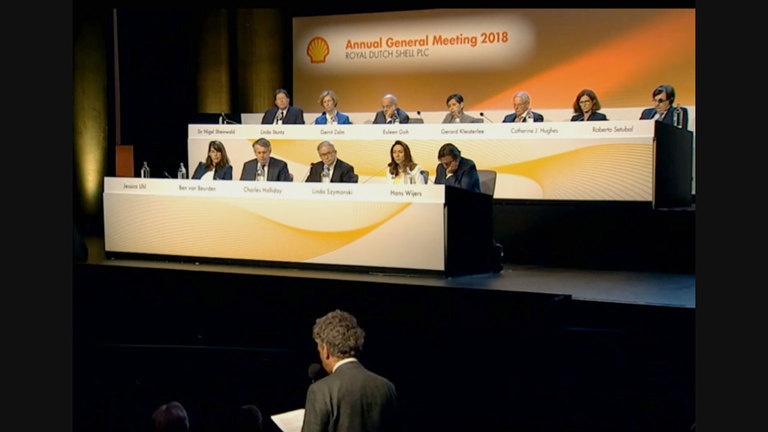Breaking the Oil Stranglehold: Mark van Baal / Founder, Follow This
Dutch shareholder activist Mark van Baal challenges the power of Big Oil and urges these influential companies to abandon fossil fuels and commit to a fossil free future.




Transcript
Direct Talk
Breaking the Oil Stranglehold
Climate change is gathering pace.
But the scientists say it's not too late.
If the world moves quickly,
it's still possible to limit the rise in global
temperatures to the UN goal of 1.5 degrees.
That target was set by
world leaders in Paris in 2015.
One of the key factors
will be the role of the oil companies
and the actions they take
to shift from fossil fuels to renewables.
One man in the Netherlands, Mark van Baal
has a unique approach
to tackling the climate crisis –
he's a shareholder activist
who's fighting the oil companies
from the inside,
by tabling shareholder motions
to pressure them to move more quickly.
If you look at the
big oil companies in the world,
Exxon, Chevron, Shell, BP,
they are more powerful than most governments
and they have to take the bold
and brave decisions and they have
to stop drilling for more oil and gas
and invest all these billions
into renewable energy.
And since fossil fuels are causing
the majority of all CO2 emissions,
they need to change.
If they don't change,
there's no chance at all
to meet the Paris climate accords.
And we will end up in a world
devastated by climate change.
In 2015 Van Baal gave up a career in journalism
to set up the campaign group, Follow This,
believing that the
world's six largest oil companies –
known as Big Oil -
could best be changed from within.
He''s recruited thousands of ordinary people
to buy shares in oil companies.
I realized that I would never be an
influential journalist who will change Big Oil.
I thought who does Big Oil have to listen to?
The only people they have to listen to
are their shareholders
and in end of the day, that's you and me
with our savings accounts
and our pensions accounts.
So I thought I need to gather shareholders.
Gather big institutional
investment pension funds
behind the idea that Big Oil has to change.
First, I tried to approach pension funds.
They all thought
it was a very sympathetic initiative,
but they didn't want to join.
So then I concluded the only way
to get this off the ground
is by grassroots organization.
So I opened a website
where you could buy one single share in Shell
and send an email to the CEO of Shell
with the message,
"Dear Ben, I'm your new shareholder."
"You can change the world
by shifting your investments."
"You have my support."
And because a few hundred people did that,
I could go to the
shareholder meeting of Shell
and speak on behalf of a few hundred people.
Since 2015, Van Baal has been attending
the annual meetings of oil companies
and, with the backing of his supporters,
tabling motions
with the simple aim of forcing them to
commit to the goals of the Paris agreement.
A major point of contention
has been the reluctance of the oil companies
to address the emissions
caused by the use of their products.
But, finally, he feels he's making progress
The impact we have,
that now five oil majors
have reluctantly set targets to
decrease all their emissions,
including their product emissions
because we put the resolution on their agenda
and big institutional investors
started voting for it.
The core of these climate resolutions
is that we request the companies
to set a target to
cut emissions of all their impacts.
So not only the emissions
they cause themselves,
that's just 10, 15% of their impact,
but most important,
the emissions of the energy products they sell,
that's 85% of their impact.
Before we started filing
these kinds of resolutions,
all oil majors said
"The emissions of our customers
is not our responsibility."
Some even say,
"We don't know what are customers do
with our products."
So they ducked the responsibility for that.
And then it's quite easy to make promises
in line with the Paris climate agreements.
You say
"Yeah, I'm going to decrease my own emissions
but what my customers do with my products,
that's not my responsibility,
not my problem."
One of Van Baal's main targets
has been the Anglo-Dutch oil giant, Shell.
He addressed the company's new Chairman,
Sir Andrew Mackenzie,
at its annual shareholder meeting
in December 2021.
In your tenure Mr Mackenzie
in your tenure you have to take
very bold and brave decisions
to drive the energy transition,
to achieve the Paris accord
I believe that what Shell does
in the next period
will define a lot of progress
not just for Shell
but for the rest of the world
and I feel it's a real privilege to
have been given the opportunity to chair Shell
at this very important time.
We had many meetings with Shell,
very polite engagement meetings,
as they call it,
investor engagement,
confidential conversations, about our ask
and about their strategy.
Shell is convinced that they're doing enough
and we just show them the science
and tell them,
"Yeah, if you really want to be Paris-aligned,
if you really want to have targets
in line with the Paris agreement,
you have to halve your emissions
in the next decade."
We think these oil majors,
as soon as they've taken a decision,
as soon as they have the mindset
that fossil fuels
can be replaced by renewables,
the energy transition will go very fast,
but it's a matter of mindset.
And in the boards of these companies,
the mindset is still the only way
to provide energy is with fossil fuels.
In 2021,
a Dutch Court strengthened Van Baal's hand
when it ordered Shell to cut its emissions
by 45% by 2030.
Support for Follow This has grown rapidly
with individuals buying shares
in a number of oil giants.
On the website you can buy a green share
simply by clicking this button,
choosing which company
you want to have a green share in,
for example BP from 10 euros,
and here you just fill in your name
We are now with over 8,000 people who have
one or more shares in one of these companies,
and on behalf of them
we go to the shareholder meetings,
we file resolutions
and we support these companies to change.
So all these 8,000 people
they are green shareholders.
So they are partly owner of these companies,
and they can ask them questions.
We do that on their behalf.
So it's really empowering for people
that they can join this
because I think many people feel like myself,
quite powerless in this
global problem of climate change,
of course, you can put
solar panels on your roof,
you can stop eating meat,
but that doesn't change anything
to this huge global problem.
Mark van Baal is based in
the Dutch capital, Amsterdam.
He was born and brought up
in rural Netherlands.
I was born and raised in a small town
in the middle of the Netherlands,
in a loving Christian family
so I was brought up with the idea
that you're not on earth
to pursue your own interests,
but of the society at large.
I followed quite a traditional path.
In high school,
I liked mathematics and physics.
So I chose that subject.
And I went to Delft University of Technology
to study mechanical engineering.
I became an engineer.
I did my conscript time in the Navy,
and then I went to work for several companies,
in technical and commercial jobs.
But Van Baal became disillusioned
with the corporate sector
and wanted to join the fight
against climate change.
He decided to train as a journalist.
And I decided to be a
climate and energy journalist
because I thought, okay, I'm 36 now.
I have no experience in journalism,
but this is a niche I can be useful in
because there are not many journalists
who know, who understand technology
and there are not many engineers
who can write.
So I started writing about
climate change and the solutions.
Because right from the start, I was convinced
that Big Oil can make or
break the climate crisis.
Van Baal gave up his career in journalism
to become an activist.
He has faced a tough battle
persuading the oil companies to change.
He says they've resisted change for too long.
There's no time
for a slow transition anymore.
It would have been great if these companies
would have accepted their responsibilities
in the nineties or in the eighties
or even earlier
when they knew about climate change.
Some even knew in the seventies already.
So we could have had a very slow, gradual
transition from fossil fuels to renewables.
Big Oil has chosen to postpone action
by sowing doubt
about the science of climate change.
They've succeeded in that for decades.
And now we only have a
very small window of opportunity to change.
So this means today we have to make very bold
and brave decision to shift investments.
And that has to be done by the oil industry
because the fossil fuel industry is responsible
for more than half of global emissions.
The technology is there.
It's very important to emphasize that
wind farms,
solar panels, they're producing electricity,
that's cheaper than fossil fuel power plants.
The only issue is that it's intermittent.
So, it's when the sun doesn't shine
and the wind doesn't blow,
you need to store it.
So storage is the big challenge,
but we have enough engineers to solve that.
Van Baal's campaign is now
getting global recognition.
He was recently invited
to give evidence to the US Congress.
If you were to believe
the advertisements of Big Oil
and what their executives
told you last October,
you would think they're taking adequate action
to fight the climate crisis -
in reality they are not.
The goal of the congressional hearing
is to make clear that
Big Oil is not part of the solution yet.
They all have this green advertising.
They all talk about
being net zero by 2050, one by one,
but they're not taking adequate action
in the next decade.
It is quite clear now that
they won't change on their own accord,
that there also needs to be legislation.
We have such a small timeframe
to avert catastrophic climate change
that we need everything.
We need very strong legislation.
And we are convinced that
the pressure of shareholders is crucial,
without the pressure of shareholders,
they won't change.
Since February 2022, the war in Ukraine,
and sanctions imposed on Russian oil and gas,
have caused a huge rise in energy prices
and a search for alternative supplies.
Van Baal hopes the crisis will be
a catalyst for positive change.
So, the Russian invasion of Ukraine
has made the world realize
that this war is funded by fossil fuels.
Half of the Russian government income
is fossil fuels.
So we have to make sure
Putin doesn't have that income anymore,
so we have to get rid of Russian oil and gas.
We were in the process of getting rid of
oil and gas altogether in the energy transition.
So I think the only wise decision
to make now is:
okay, we have to replace fossil fuels anyway,
let's start with replacing fossil fuels
from Russia with renewables
and then follow through.
But it would be a big mistake to replace
Russian fossil fuels by new Western or
Middle East oil and gas.
Because then we would slow down
the energy transition.
So for example car factories have to switch
to electric factories as soon as possible,
other factories have to build
wind turbines in enormous speed.
To make sure we can be
without Russian oil and gas
Above all, Van Baal believes that
we as individuals - by becoming shareholders –
can force Big Oil to change.
Shareholders are our last hope
in the fight against the climate crisis.
Big Oil doesn't change on their own accord.
The only ones they really listen to
are the shareholders,
so shareholders have to step up
and compel them
and support them to change course.
Shareholders in Big Oil are our last hope.